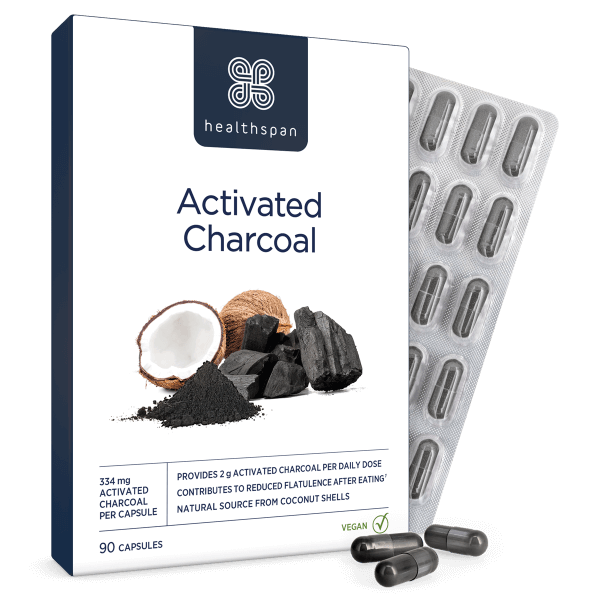Could activated charcoal help soothe your digestion and ease flatulence? Patsy Westcott investigates.
🕒 5 min read
Do you struggle with flatulence, burping, a rumbling stomach, bloating or digestive discomfort? If so, help may be at hand. Charcoal has long been used to ease problems caused by excess gas (wind) in the digestive tract.
What causes flatulence?
We break wind (pass gas – or flatus, to use the medical term – through the rectum) up to 40 times a day. The reasons? Certain foods, as well as beer, white wine and fruit juices, are often offenders, especially when it comes to smelly wind.
Other culprits include swallowed air, indigestion, lactose intolerance, some sweeteners, bowel conditions such as Crohn's disease, coeliac disease and IBS, as well as some medicines including antibiotics, NSAIDs, statins and some laxatives.
Fibre and flatulence
We should all aim to consume 30 grams of fibre a day, but high-fibre foods can also cause flatulence. Ingredients such as onions, garlic, leeks, cabbage, pulses, fenugreek and some seeds can increase flatulence by boosting fermentation of food by gut bacteria and promoting gas retention in the gut.
Sadly we also often become more flatulent as we get older, as a result of a more sluggish metabolism, less efficient digestion, and weaker muscle tone in the rectum.
Although flatulence is perfectly normal and natural, it can be uncomfortable, smelly and embarrassing. Activated charcoal can help to reduce excessive flatulence after eating and relieve discomfort and embarrassment caused by excess gas.

High-fibre foods are good for us, but some types can cause excess wind.
What is activated charcoal?
Charcoal has been used medicinally since ancient times as an antidote to poison, and is still a pillar of emergency medicine in cases of accidental or deliberate overdose or poisoning.
It also has a long pedigree of helping to reduce flatulence. A 19th-century medical textbook, Vegetable charcoal: its medicinal and economic properties, with practical remarks on its use in chronic affections of the stomach and bowels, recommends it for its ability to 'absorb noxious and offensive gases when they exist in excess, remove flatulence, and by a similar process of slow combustion, render digestion both easy and agreeable.'
Charcoal biscuits, made by mixing powdered willow wood charcoal with flour, butter, sugar and eggs, were a favourite remedy for flatulence in the 19th and early 20th century.
More recently, scientists have been investigating the effects of activated charcoal, also known as activated carbon, for digestive health, and in particular to help reduce flatulence and other symptoms of excess gas such as uncomfortable bloating.
This research led, in 2011, to EFSA (the European Food Safety Authority), approving the health claim that activated charcoal 'contributes to reducing excessive flatulence after eating.'
As well as in charcoal tablets, you'll find activated charcoal in tooth-whitening toothpastes, deodorants and skincare products, as well as in water filters. It's also being investigated as a potential treatment for diarrhoea, and shows promise in helping to protect the gut microbiota from being disrupted in those taking intravenous antibiotics.

Activated Charcoal
Reduces excessive flatulence after eating
- Relieve post-meal discomfort and avoid embarrassment from excess gas
- Activated charcoal promotes digestive comfort
- 334mg activated charcoal per capsule; 2000mg (2g) per daily dose
How does activated charcoal work?
Activated charcoal is a black, odourless, flavourless form of charcoal. It's made by burning natural materials such as coconut shells, wood and other carbon-rich substances in the absence of oxygen.
The resulting carbon 'char' is then superheated to form a sponge-like substance with a huge surface area containing thousands of tiny holes, or pores. These holes trap chemicals or gases – including those produced in the stomach after meals – so they can be safely expelled from the body.
Several studies have investigated the effects of activated charcoal on flatulence and digestive discomfort. They include:
A double-blind randomised controlled clinical trial published in 1986 compared the effects of activated charcoal tablets versus placebo in two groups of participants from the US and India, who had taken a laxative called lactulose, which causes fermentation in the gut.
The activated charcoal lowered breath hydrogen levels, and reduced bloating and abdominal discomfort, compared with placebo. Breath hydrogen levels are used to test 'gassiness', because gas in the colon is absorbed into the blood and transported to the lungs, to be expelled in the breath.
A second trial published in the same year compared activated charcoal with an anti-flatulent medicine called simethicone on volunteers who took a dose of activated charcoal 30 minutes before consuming a meal containing baked beans – known for their gas-inducing properties.
The group that took activated charcoal had less hydrogen in their breath as well as less bloating and abdominal discomfort. The anti-flatulent medicine did not have any significant effect. The researchers concluded that "our data clearly indicates that activated charcoal is an effective anti-gas medication."
A double-blind, placebo-controlled trial published in 1981 found that activated charcoal successfully reduced the amount of stomach gas in people who had consumed a typical gas-inducing meal consisting of baked beans on toast, orange juice and sliced peaches.
Individuals who took activated charcoal were less flatulent and did not have the usual increase in breath hydrogen that occurs after a gas-inducing meal, compared with those who took a placebo.
How much should you take?
Experts recommend taking 1 gram of activated charcoal at least 30 minutes before a meal and a further 1 gram after you have eaten. However, some people find that simply taking an activated charcoal tablet after a meal does the trick.
- Excess gas is accompanied by persistent stomach ache or bloating that isn't helped by self-help and/or supplements
- You have persistent constipation or diarrhoea or alternating constipation and diarrhoea
- You have lost or are losing weight without trying
- You have had blood in your faeces for three weeks
- You cannot control bowel movements
- You have a fever, vomiting, chills, joint and/or muscle pain – these can be signs of infection

Activated Charcoal
Reduces excessive flatulence after eating
- Relieve post-meal discomfort and avoid embarrassment from excess gas
- Activated charcoal promotes digestive comfort
- 334 mg activated charcoal per capsule; 2000mg (2g) per daily dose







